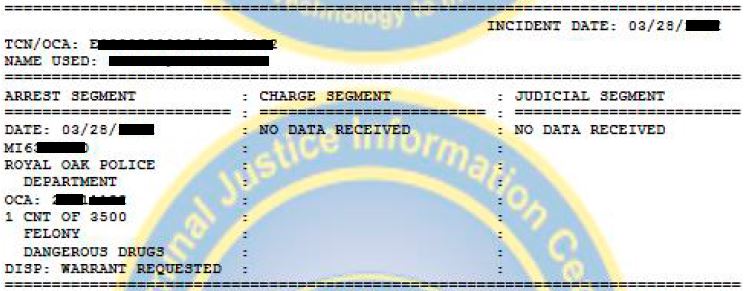The Michigan State Police must remove arrests from someone’s criminal history if they do not result in convictions.
You do not have to lose a job because of an inaccurate criminal record. If you wonder, “How do I get an arrest off my record?” you are not alone.

Arrests that Do Not Result in a Conviction Should be Removed
The bottom line is that the Michigan State Police (MSP) must remove an arrest from someone’s criminal history if they were charged with a crime but not convicted. There are various ways a person can be arrested and not convicted. For example, the arrest will remain on someone’s record if they were arrested and released without charges unless they file a request for removal with the MSP. Sometimes, the police never obtain a warrant, and the arrest stays on the criminal history. Usually, the Michigan State Police will allow the arrest to be removed after 12 months if the petitioner correctly files the request. If you wonder, “How can I get an arrest off my record?” the following information should answer your most concerning questions.
If a judge or jury finds a person “not guilty” or dismisses charges, the law requires that the State Police destroy any fingerprint and biometric data. They must remove the arrest from the acquitted person’s criminal history. Unfortunately, arrests frequently stay on criminal records because MSP refuses or neglects to clear the criminal history. The Court Clerk must report the dismissal or acquittal with identical data for automatic removal of an arrest. MPS will fail to clear the record if there is the slightest mistake or discrepancy in the data from the Court Clerk. An experienced lawyer can correct the errors and ensure the person’s criminal history is updated.
Effect of an Arrest Without a Conviction
In Michigan, it is illegal for an employer to deny someone employment based on an arrest. Unfortunately, employers routinely discriminate against potential employees because of arrest records. Because potential employers rarely explain hiring decisions, it is difficult to prove that discrimination occurred. Discrimination based on someone’s arrest record is a huge problem because a simple internet search can quickly and easily discover criminal histories from public records. As a result, employers routinely use arrests to discriminate against job applicants illegally. These records also cause problems for students, professionals, parents in divorce proceedings, immigrants, etc.

Why do arrests appear on a criminal history?
When the police or law enforcement officers arrest someone for a felony or misdemeanor punishable by 93 days or more, they take that person’s fingerprints and send them to the Michigan State Police. The judge would order someone to get fingerprinted after arraignment if the prosecutor charged them with a felony or misdemeanor by a complaint or ticket.
What is the difference between ICHAT and OTIS?
The Internet Criminal History Examine Tool (ICHAT), available through the Michigan State Police website, enables anyone to instantly access the criminal history records of those convicted or charged with crimes in Michigan and those with active criminal proceedings. Offender Tracking Information System (OTIS) provides internet-based information to the public about offenders who are previously or currently under the jurisdiction or supervision of the MDOC. OTIS is not a criminal history tool.
An example of an ICHAT report with a wrongfully reported arrest.
The photo above shows that our client was arrested for a felony, but their report’s charge and judicial segments remain blank. After hiring a lawyer, their charge was reduced from a felony to a civil infraction (a noncriminal offense). A couple of years later, the client went to look for work as a registered nurse (RN), and her old felony arrest appeared on her record, thereby threatening her potential employment. She hired LEWIS & DICKSTEIN, P.L.L.C. to completely wipe the arrest off her record!
How do I get an arrest record removed from the records of private background companies?
There are dozens, if not hundreds, of private vendors who sell criminal histories for background checks. Every business has a different procedure for deciding when to update information and how to acquire records. Providers of criminal background checks are subject to various federal rules, but none require periodic updates, unlike the regulations imposed on consumer credit reporting companies. There are several internet-based businesses specializing in requesting private background check companies to remove or stop reporting arrests that did not result in convictions.

How Can an Arrest Record Impact My Life?
Even without a subsequent conviction, an arrest record can significantly impact various aspects of an individual’s life. It’s a common misconception that an arrest won’t affect you if it doesn’t lead to formal charges or a conviction. However, the mere existence of an arrest record can have long-lasting and far-reaching consequences.
- Employment Opportunities: One of the most immediate areas where an arrest record can influence your life is your career. Many employers conduct background checks as part of their hiring process. Regardless of the outcome, an arrest can raise concerns about your suitability for a position, leading potential employers to pass over your application in favor of candidates without such marks on their records. Limitations on employment are particularly problematic for jobs requiring security clearance or positions in law enforcement and education.
- Housing Applications: Landlords and property management companies often perform background checks on prospective tenants when applying for housing. An arrest record might make you seem like a riskier tenant, potentially leading to your application being denied. An arrest record can limit your housing options and force you into less desirable neighborhoods or living situations.
- Professional Licenses: Certain professions require licensing, and an arrest record can complicate the application or renewal process. Fields like healthcare, law, and finance often have strict moral character requirements, and an arrest could be seen as a blemish on your character, even if it never led to a conviction.
- Educational Opportunities: If you’re applying to colleges or universities, particularly those with competitive admission processes, an arrest record might impact your application. While not all institutions ask about arrests without convictions, those who do may use this information as a factor in their decision-making process.
- Personal and Social Relationships: Beyond formal repercussions, an arrest record can strain personal relationships and social interactions. It can lead to stigma and judgment from peers, community members, and even family, affecting your mental and emotional well-being.
- Credit and Loans: Financial institutions may also conduct background checks when evaluating loan or credit applications. While an arrest record is not a direct financial indicator, it could contribute to a perception of unreliability, potentially affecting your ability to secure loans or favorable interest rates.
It’s important to note that while the impacts of an arrest record can be significant, you can take steps to mitigate these effects. In some cases, sealing or expunging your arrest record may be possible. Consulting with a knowledgeable criminal defense lawyer can provide you with the best course of action for your specific situation, helping to minimize the impact of an arrest record on your life.
An Example of How Removing an Arrest Can Make a Difference
John had been navigating a challenging job market with an obstacle that seemed insurmountable. A decade ago, he was arrested on charges of embezzlement. Although the charges were dropped due to insufficient evidence, the arrest lingered on his record like a shadow, casting doubt on his integrity and character in the eyes of potential employers. Despite his qualifications and experience, John faced repeated rejections. In a couple of instances, employers were candid enough to cite his decade-old arrest as the reason they couldn’t extend an offer of employment. Other times, he was met with silence, but the underlying reason was palpable — the blemish of a past that he couldn’t escape.
To turn his fortunes around, John sought the expertise of LEWIS & DICKSTEIN, P.L.L.C., a decision that marked the beginning of a new chapter. The firm, known for its meticulous approach and dedication to its clients, immediately set to work on John’s case. Their deep understanding of the law and the expungement process enabled them to navigate the complexities of having John’s arrest removed from public records swiftly and efficiently. Within a few weeks, John’s record was clear, freeing him from the chains of his past.
The impact of this action was transformative. Now, with a clean slate, John re-entered the job market with renewed hope and confidence. It wasn’t long before he secured a position as a human resource manager at a Fortune 500 company, a role that once seemed unattainable. Grateful for the prompt attention and outstanding results delivered by LEWIS & DICKSTEIN, P.L.L.C., John could finally focus on his career without the specter of his past arrest looming over him. This experience underscored the profound difference that clearing an arrest record can make in securing employment and restoring one’s reputation and self-worth.

How do I get an arrest off my record? Call us for help today.
The arrest will only come off your record if the files with the Michigan State Police and the court are correct and match. If someone does not have experience correcting records, getting an arrest off your record can be frustrating and daunting. The best way to remove the arrest from your criminal history is to hire an experienced lawyer with expertise in correcting and eliminating arrest records. If you are aware of errors in your criminal history, the defense team with LEWIS & DICKSTEIN, P.L.L.C. can help you set the record straight. Call us today for a free consultation and confidential case evaluation. We will find a way to help you!
Call us today at (248) 263-6800 for a free consultation or complete an online Request for Assistance Form. We will contact you promptly and find a way to help you.














